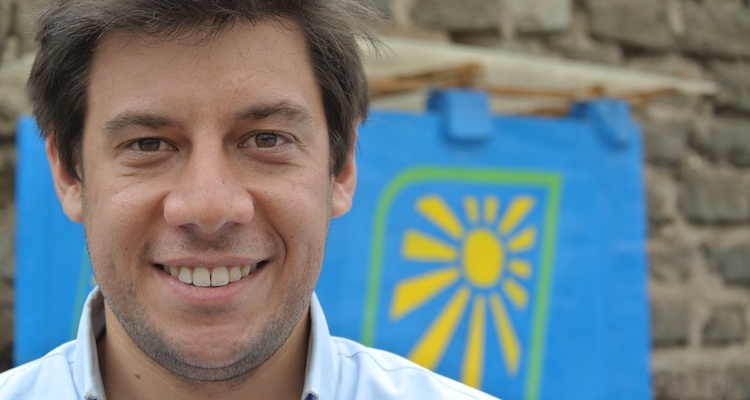Listen Now
David Auerbach is a co-founder of Sanergy, a pioneering social enterprise in Nairobi, Kenya dedicated to building healthy, prosperous communities in Africa’s informal settlements by making hygienic sanitation affordable and accessible for everyone, forever. As of September 2015, Sanergy has a network 748 Fresh Life Toilets run by 370 Fresh Life Operators. The entire network is used 33,000 times per day. Since November 2011, Sanergy has removed and safely treated over 6,200 metric tons of waste from the community. Previously, David co-ran Partnerships at Endeavor, a non-profit that helps high-impact entrepreneurs in the developing world. He served as the Deputy Chair for Poverty Alleviation at the Clinton Global Initiative in 2005-6. He taught in central China for two years as a Yale-China Teaching Fellow. He began his career researching foreign policy at the Center for American Progress. David is an Ashoka, Echoing Green, and Rainer Arnhold Fellow. You can connect with David here: http://saner.gy
IN TOR 087 YOU’LL LEARN ABOUT:
- Sanitation challenges in the Kenyan slums, and the impact of addressing them.
- The sanitation life cycle.
- Pride, dignity, social recognition and intangible benefits from self-sustaining social entrepreneurship.
- The mindset of high impact social entrepreneurship.
- Trade-offs for founders in their location decisions.
OUR CONVERSATION INCLUDES THE FOLLOWING:
Organizations
- Sanergy
- Fresh Life https://www.facebook.com/FreshLifeKenya
- Endeavor http://www.endeavor.org
- Clinton Global Initiative https://www.clintonfoundation.org/clinton-global-initiative
- Center for American Progress https://www.americanprogress.org
- Ashoka https://www.ashoka.org/fellows
- Echoing Green http://www.echoinggreen.org/fellowship
- Mulago Foundation http://mulagofoundation.org/fellows/current
- MIT and their D-Lab’s Development Ventures class https://d-lab.mit.edu/courses/development-ventures
- Yale University
- Innovations for Poverty Action http://www.poverty-action.org
Topics
- Sanitation
- High impact entrepreneurship
- Human waste life cycle and management
- Development business models and value chains
Places
- Kenya
- Nairobi
- China
EPISODE CRIB NOTES
Sanergy Healthy, prosperous communities through sanitation. Low cost toilets. Also provide training, consulting, marketing. And by-products, like fertilizers. Why 8 million people living in slums with sanitation problems. 25k children die every year from this. 1MM lost per day for the Kenyan economy in productivity. How, the genesis 4 co-founders. Met at graduate school at MIT’s Development Ventures class. It challenged them to find solutions for global situations. He came from teaching in China, lived poor sanitation situations. Two problems that meet in the value chain: sanitation and toilet, and waste management. Most models for sanitation only do one part or the other, not the full waste cycle. The business model Graduate school allowed them to obtain seed capital through contests and social enterprise fellowships. ’11: Launched, the first toilet. Equity round and grants. Focus is self-sustainability, but grant can still provide room for action. Now, in the midst of expansion, new projects will cover approximately 40% of slums in Nairobi. Working with landlords, schools. To make sanitation pervasive. Community responses ’12 Agnes opens a toilet operation, then two more. He interviews her, she’s proud and she has a legitimate source of income, no more police persecution and assumptions of prostitution. It brought her dignity back. Personal journey ’03 Writing policy briefs, realization: “I’ve done nothing in the world,” leads him to China. Warms up to a career in development. Come entrepreneurship, sees the parallels. But didn’t have an idea. Decided to join MIT. An entrepreneur faces failure on a daily basis, it’s due when you’re doing something that has not been done before. You take part on a journey with others, they pick you up. Kenyan home (nearly 5y) A great place for social enterprise, there’s a community of smart people in development, and it is a highly entrepreneurial culture. They don’t miss the hubs. There is a strong commitment to be close to the action. It’s harder to obtain funding and partnerships, it’s a trade-off. We have seen the change in people’s health and bottom lines. The “sanitation provider” is a figure of respect among communities. We stay humble about what we achieve. The next 5y Keep increasing coverage, that means innovation in the distribution systems. Behavioral change research, partnering with Yale, Innovations for Poverty Action. Stories Half the team is Kenyan, the other is from abroad. They’re building a company and seeing people grow, become enthusiastic about the product, lose fear of selling. Believing makes everyone move forward. Advice If you have an idea you think works, get into the community, find the people, hear them out. Listen to other people trying to solve problems, you nurture the way you think about your own, and it promotes synergies.Please share, participate and leave feedback below!
If you have any feedback you’d like to share for me or David, please leave your thoughts in the comment section below! I read all of them and will definitely take part in the conversation. If you have any questions you’d like to ask me directly, head on over to the Ask Stephen section. Don’t be shy! Every question is important and I answer every single one. And, if you truly enjoyed this episode and want to make sure others know about it, please share it now:[feather_share show=”facebook, twitter, linkedin, google_plus” hide=”reddit, pinterest, tumblr, mail”]
Also, ratings and reviews on iTunes are very helpful. Please take a moment to leave an honest review for The TOR Podcast!




